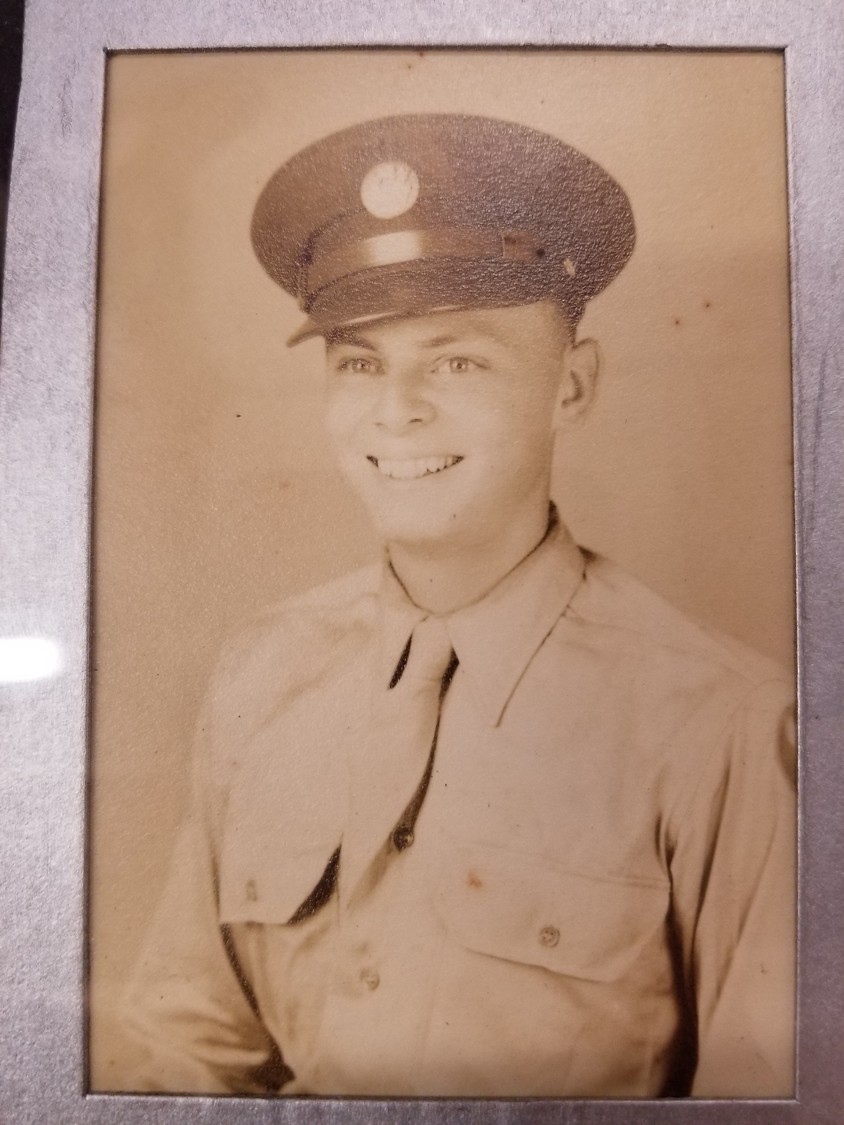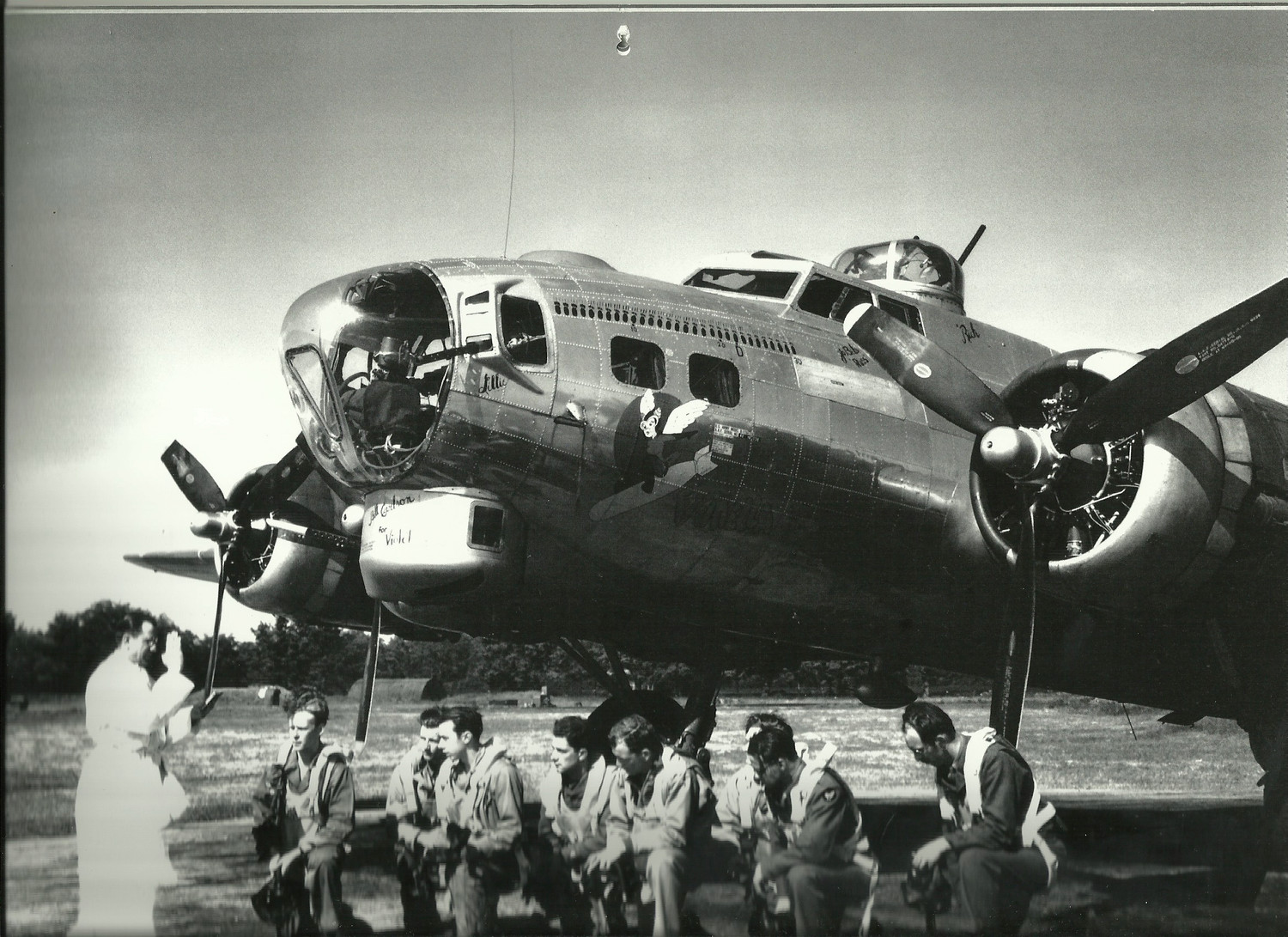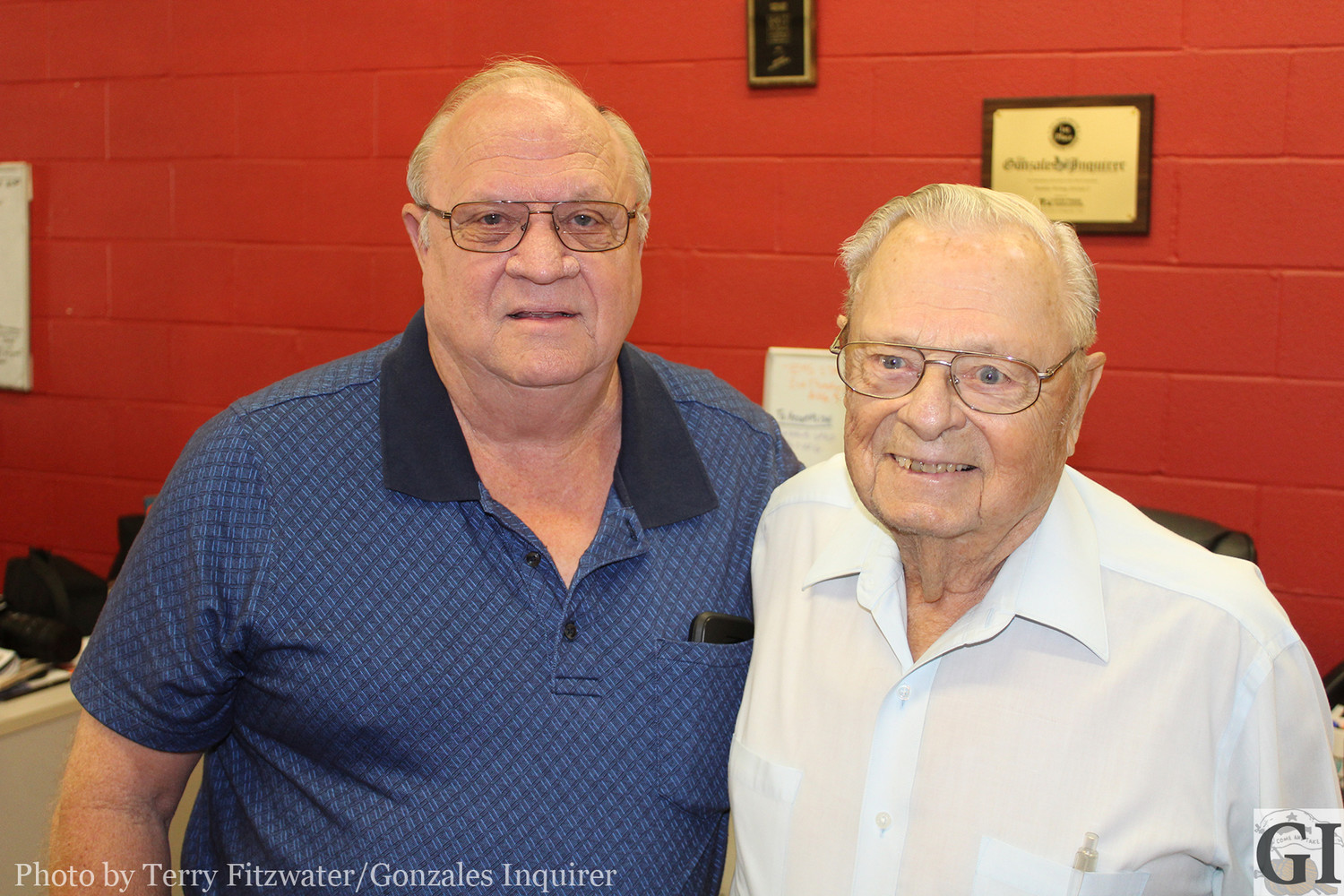William Berger: a hero for all times
Editor’s Note: This is a first in a series of articles featuring the lives of Gonzales County veterans who have served their country. It is our hope to interview veterans of WWII, Korea, Vietnam and the Gulf War era. If you have someone you would like us to interview, or know someone who should be, please send an email to publisher@gonzalesinquirer.com or call 672-2816 and ask for publisher Terry Fitzwater.
Student. Warrior. Police Officer. Judge. How many people in life can put all of those accomplishments in one resume?
William “Bill” Arthur Berger of Gonzales can. His is the story of a small-town Texas boy rising to be a hero as a tail-gunner on a B-17 bomber during World War II, then going on to become a Texas lawman and local judge after the war.
Berger was born in the Mission Valley area of south central Texas on April 18, 1926. His parents, Fred and Lena Berger, were the owners of a farm that produced cotton, corn, maize and hay. They had six children with Bill being the oldest. Bill was followed by Allan, Doris (now deceased), Marjorie, Baltus James (now deceased) and Fred.
Growing up, Bill was an avid tennis player and played a lot of softball.
“I loved playing tennis growing up,” Bill said. “I was pretty good at it and even won a few championships. I also liked to play softball and other sports but I was never really interested in basketball.
“In high school, at Patti Waelder High School in Victoria, I tried out for the Sting Rays football team. But at 5-foot-10 and only 125 pounds, the coach told me I was probably too little to play football so I gave that up.”
Berger’s life was simple and filled with the thoughts and dreams of normal Texas teenagers back in the late 1930s and 40s.
“Things started to change for me in 1940,” Berger said with a huge smile on his face.
“Back then you only had to be 14 in order to get a drivers license so my brother Allan and I decided to buy a 1929 Chevrolet touring car. That really opened up the world and other opportunities,” he chuckled.
But the remote world of rural Texas was about to change for Berger. On Dec. 7, 1941, the Japanese bombed Pearl Harbor, forcing the United States into World War II. Berger was in his sophomore year in high school, but he figured the war might be in his future.
After graduating, Berger spent a semester at Victoria College, but he discovered he had an interest in something other than books.
“There was an air base around our community, and I found I was thinking about flying all the time,” Berger recalled. “Watching all those P-51 fighters flying over, I had a desire to fly.
“So I went to my mom and dad, and asked them if I could enlist when I turned 17 and they agreed to let me sign up.”
Berger was sent to Fort Sam Houston where he hoped to be a cadet for pilot training. Unfortunately, a lot of the pilots were college students or graduates, so Berger was not accepted into flying school. There was an opening in radio school, and he moved on to that option.
At the beginning of his military career, Berger was sent to Kingman, Ariz., where he was then trained as a gunner. He wanted to be a ball turret gunner, but his height precluded that so he opted to be a tail gunner, a position which had a life expectancy in B-17’s of “five seconds because that’s where all the German fighters would attack you from.”
From Kingman, Berger joined a team of 4 officers and 6 enlisted men that flew to Tampa FL for flight training. Then it was on to Macon, Ga. to pick up and outfit a new B-17 bomber. The crew flew from Macon to Bangor, Maine, then had to fly to Goose Bay, Labrador on their way to England. It was on this flight that the entire crew almost died the first time.
“We were flying over the Atlantic in our new bomber and boy was it cold,” Berger said. “We were well out over the ocean when the pilot came on and said we were having problems with ice forming on our wings. We all stared out the windows and watched the ice buildup. We started flying closer to the water and we all thought we were going to have to ditch in that freezing water.
“Thankfully, the deicers started working just as we had come to the realization we were going down. We made it safely to Goose Bay.”
From Goose Bay, it was on to North Hampton, England where Berger was assigned to the 92nd Bomb Squad and the 327th Bomber Squadron. Upon arrival, the crew was trained in combat, aerial maneuvers, and gunnery while they waited for their first mission. During their free time, Berger and his mates bought bicycles and traveled by bike to the nearest towns and USO.
“We would dance with the girls, and I even took one English gal out on a date while I was over there, but nothing came of it,” Berger said. “I often wonder what to the people I met over there, what their lives were like, and if they are still alive today.”
In April, as the war was winding down in Europe, Berger and his crew drew their first mission. “We were going to bomb a ball bearing plant,” Bill said. “We flew all the way there, but there were no fighters that harassed us. I thought ‘hey, this isn’t as rough as I thought it was going to be,’” he joked.
Then came April 18, 1945 and the day that Bill saved the entire crew from certain death. It also happened to be his 19th birthday.
“We were flying over Dresden, Germany to hit a rail yard,” Berger recalled. “The chief navigator missed our mark, so we had to circle all the way around to drop our bombs. I started to get worried because on this mission there were fighters and a lot of flak. All the B-17s in the attack formation had their bomb bay doors open as we lined up on the target.
“I was in the back of the plane and saw a direct flak hit on the bomb bay of a B-17 flying above us,” Berger said. “The plane blew a part, then pancaked on another plane just below it. All in all, three planes were hit by that one burst and 30 men died.
“As the B-17 blew apart, one of its engines was on fire and was coming right toward our plane,” he continued. “I yelled on the intercom ‘Hard Right Rudder!’ and the pilot did just as I yelled. He wasn’t supposed to listen to the men in the plane like that, but he did and it saved us from being hit.
“That burning engine came so close to hitting us that I could have reached out and touched it from my position in the back as tail gunner. When we landed, all the crew said I saved us from going down.”
Berger flew one more mission the next day, and then his crew was told to stand down. When they went back on the line for missions, for one reason or another they had 10 straight missions scrubbed. Then came the end of the war in Europe and Berger’s life as a combat tail gunner was basically over.
“I was glad the war in Europe was over, but I didn’t get too excited because I thought I would have to go to the Pacific,” Berger said. “Later, I got orders to go but then they rotated me back to the states. I came home and was sitting in a movie house in Victoria when they started flashing the lights and announced the Japanese had surrendered in the Pacific. We left the theater and went outside. Everyone was yelling and cheering and tooting their car horns. It was quite a night.”
After the war, Bill went in to the Army Reserves and stayed in the reserves for over 20 years. He met his wife Ruby while going to Myersville one night with his friend Hugh Young and saw her play volleyball.
“I told Hugh I had to meet that girl,” Berger smiled. “We started dating, I immediately took my mustering out pay and went to Zales and bought her ring.
“You know, she never really said yes,” Berger said laughing. “But she never said no either!”
Bill and Zena have been married for 72 years and had three boys together: Robert, Ricky and Randy.
After doing a brief stint as a delivery driver for RC Cola and Nehi Beverage, Berger became a DPS trooper in 1947. Captain T.R. Loveless assigned him to be a drivers license examiner, and Bill spent 33 years and 10 months in that position. Many of Gonzales’ residents today had their license issued by Berger.
While on duty in Nixon in 1951, Berger was almost shot in the line of duty. He had gone into a bank to have a check cashed, but the bank was being robbed while he was there. He had his uniform on, and the robbers thought he had been called to the scene. One took a shot at Berger, but it hit the teller window as shrapnel hit Berger. Berger hit the floor and played dead like he had been trained in the military and survived.
“They caught the guys right away,” Berger said. “But I had to call my wife and let her know I hadn’t been killed because I knew the word would get out. Sure enough, not 10 minutes after I called my wife a neighbor called her and told her that I had been shot.”
Berger has the .38 pistol that the robber shot at him with to this day.
After serving almost 34 years as a DPS officer, Berger retired and then became the Justice of the Peace on July 1, 1981. He served in that position for 20 years before retiring in 2002.
“I am proud of my service, but I am no hero,” Berger said. “I have had a good life, I have a wonderful wife and family, and have no regrets.”
Except one. He would like to go see the World War II Memorial in Washington D.C.
For an American hero like Bill Berger, it would be a great thing if we could make that happen.
Comments












